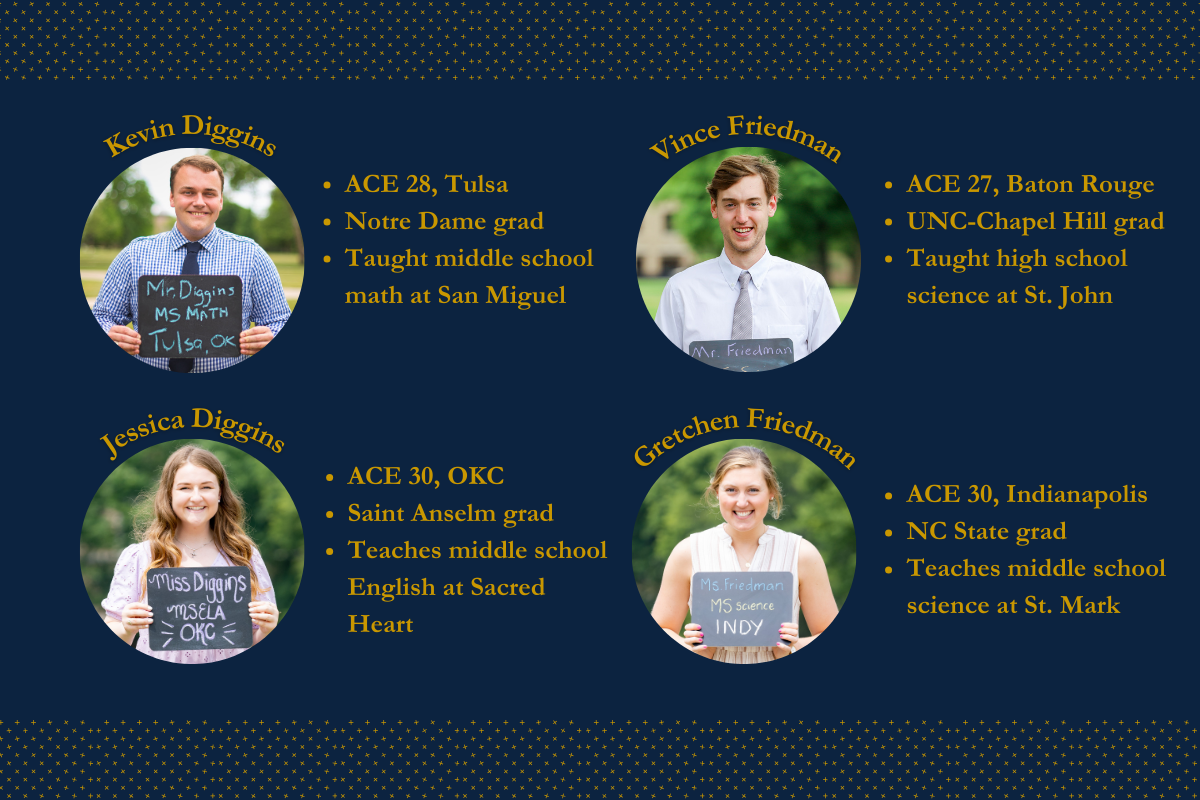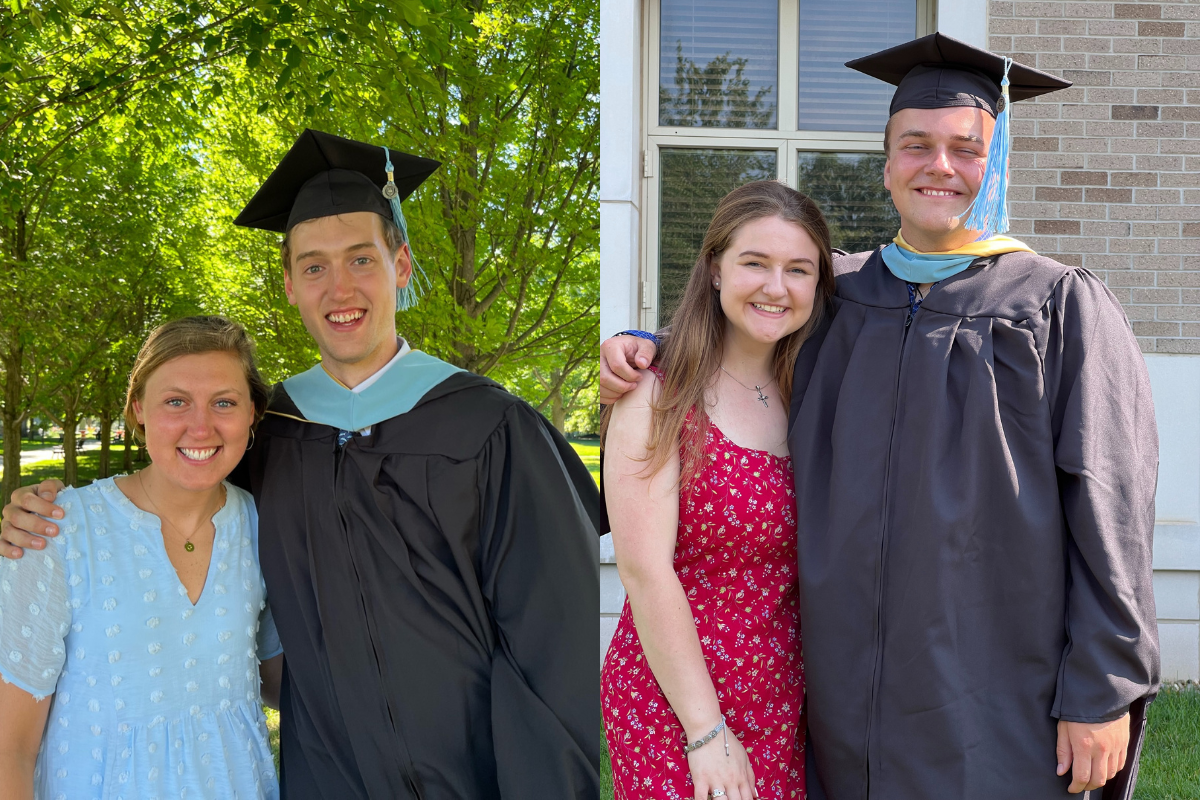Throughout the years, ACE has had a few sets of siblings come through Teaching Fellows (including Jimmy and Patrick Ryan, who we interviewed last year). Our 30th cohort of ACE teachers includes two brother/sister duos – two teachers whose older brothers are recent ACE graduates. We asked them about their experiences and what advice they received from their older siblings as they take on their first year of teaching.
Meet our siblings:

What behavior did you see growing up that will help them most as a teacher?
Kevin: I think it’s just the passion and commitment Jessie has to teaching. When she says she’s wanted to be a teacher for a long time – it was like third grade – this has been in her sights for just such a long time, and it’s always felt like a natural thing. She’s very passionate about it, and you can tell just in any conversation with her just how much she cares about her students and the subject.
Vince: I’ve always admired Gretchen’s creative spirit. Whether it was finding ways to entertain ourselves on long car trips to Wisconsin or figuring out family projects at home, we always turned to Gretchen’s playbook for the right solution. As Gretchen started high school, I noticed how her creativity manifested as a tremendous amount of patience and grace when working with different groups of children.
Jessie: Kevin is the most overwhelmingly, insanely patient person that I have ever met in my entire life. I can say that this benefitted him as a teacher because I’m proud to say I was his first student. I struggled so much with math and chemistry and physics and this absolute saint of a boy helped me so much at the kitchen table.
Gretchen: Growing up, Vince and I would always do our homework together at our kitchen table. He encouraged me to think deeper when I asked him for help, and he rarely gave me any direct answers, although I often sought them. He taught me to be consistent with studying and ask reflective questions while being patient and willing to give his time to assist me. I saw in Vince’s example that my role as a teacher extends beyond simply educating my students. It is important to be there as a daily role model and example of Chirst’s life for my students.
For younger sisters:
How were you affected by your brother doing ACE?
Jessie: Knowing he had the confidence in me that I would be able to do it – knowing me so well and knowing the program so well – definitely pushed me over the edge because I’m not sure I would have had the courage to move 25 hours away from home if he hadn’t moved to Oklahoma before I did.
Gretchen: Vince often told me that teaching is challenging but learning to teach someone is one of the greatest skills in any profession. No matter the subject, I wanted to develop the skills to be able to break down a complex topic to a level of clarity for someone to understand. Beyond teaching, the compassion, humility, and steadfast determination reflected in Vince's attitude toward the ACE program motivated me to participate in ACE.
What advice did your brother give you as you started ACE?
Gretchen: No spoken advice can equate to the true magic of seeing the ACE community firsthand when I visited Vince in Louisiana during his second year of teaching. Although I suffocated from the deep South humidity, the late-night trip to Vince's classroom to print his students’ tests for the next day gave me every piece of advice I needed as I started my ACE experience – you can never underestimate the power of the extra little things you can add to a lesson, say in the morning, or time spent outside of the 8-3 school day that prove to your students you care.
Jessie: I admire Kevin a lot in that he’s very capable in surrendering to the will of God, and I really struggle with that control. (Giving up control) is obviously a huge part of ACE, and that trust fall into God’s plan for you and going where you’re needed and not where you’re comfortable – being able to hear that insight from him and seeing him do that firsthand was so encouraging.
What is something you want to learn from them about teaching and ACE?
Jessie: During April Retreat, I met Kevin’s principal and heard her talk about the way that his students cared for him. When he came back home, he told me the little things his students did for him as he was leaving – they had a picture of themselves that they framed and signed for him. We all go into ACE wanting to have an impact, but we want to do that in a way that actually serves our students as opposed to patting ourselves on the back. I think he struck that balance really beautifully.
Gretchen: Vince has greatly succeeded in his athletic career, and it brought me a lot of joy to see him share that knowledge with his younger students. I would love to learn from him how to be a good coach, passing along the value and importance of teamwork. I don’t think I will be able to impress my players with a dunk like my older brother, but I hope to embody the same positive and fun environment he created with his students and players.
For older brother:
What did you learn in ACE that you’ve taken beyond ACE?
Kevin: As a civil engineer, I’m working on a construction site and working on roads in neighborhoods a lot of times. Residents will come outside with questions about all sorts of things, and I’ve seen a lot of the contractors get very focused on what their work is. Anyone who is challenging that is slowing it down. I compare it to parent interactions – this is someone who has a huge stake in what you’re doing right now. For you, it could just be your day-to-day – I was teaching students every day, I was in a routine, and I had relationships with these students and had a plan, but it was important to make sure that these people who had such a strong connection to the student felt that they knew what was going on too. On top of that, if you can interact with middle schoolers, then you can interact with most people.
Vince: The importance of pivoting – there were countless lessons, conversations, or whole days that demanded flexibility and a different course of direction to reach my students where they were. Each of these moments strengthened my ability to think on my feet and try something new. Now as a medical student back in Chapel Hill, I find myself constantly relying on this adaptability.
What advice do you want to pass along to your sister as they begin teaching?
Kevin: The biggest thing I wanted to communicate was just that openness to new experiences and learning to adapt because you have no idea what is going to happen everyday. You could have the most perfect lesson plan, and you’re ready to go and the principal walks in and says we’re actually having an assembly in the middle of class. That was something I struggled with – learning to be able to adapt and shift as needed.
Vince: My advice is to lean in – lean in to the early morning drives to school and the late nights lesson planning. These long and seemingly futile moments are great opportunities to pause and remember your 'why.' Lean in to your ACE community, those you live with and those across the country. You're surrounded by a great support system that will help get you through the tough days. Lean in to the families and community at your school who will bring so many experiences, lessons, and love into your classroom and life. It really is a narrow window to share your gifts with others and touch the lives of many. As John Wooden says, and our dad would often remind us, "Make each day your masterpiece."
 Alliance for Catholic Education
Alliance for Catholic Education
